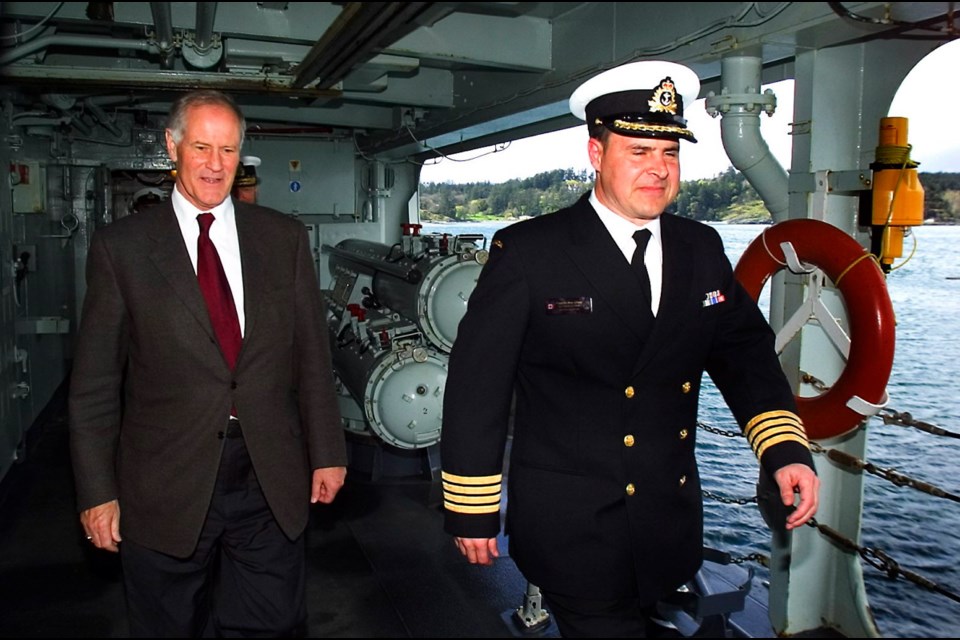This is an excerpt from The Call of the World: A Political Memoir by former federal cabinet minister Bill Graham. In it, he writes of the involvement of his father, financier F. Ronald Graham, in this newspaper, more than half a century ago. Graham will be in Victoria at a book event at 2:30 p.m. Friday, June 10 at Munro’s Books on Government Street.
As a student of history, I have always been interested in politics and international relations, but that was a long way from seriously thinking of running for public office myself.
When I bounced the idea off my father one day as a kind of romantic possibility, he said, “Politics is a dirty game, Bill. I’m not sure you want to get involved in that.”
Like many successful capitalists, Dad was a fiscal conservative intellectually and a Progressive Conservative politically. He associated with wealthy Republicans in New York and California, considered Roosevelt’s New Deal bad economics, and once told me how proud he was to have been introduced to an American audience as the Alexander Hamilton of Canada.
Nevertheless, it wasn’t in his nature to be doctrinaire about anything, except perhaps in his contempt for the socialist views of the CCF/NDP.
He gave money to the Liberals as well as to the Conservatives. He became close to C.D. Howe, Louis St. Laurent’s “Minister of Everything,” after they had taken a business trip to Argentina together in 1934.
And in 1960 he had an epiphany moment that turned him against John Diefenbaker for the remainder of his life.
Dad and Max Bell owned FP Publications, which in turn owned the Edmonton Bulletin, the Daily Colonist and the Victoria Daily Times. One evening in London, Dad and I had dinner with Roy Thomson, the Canadian-born media tycoon, who talked about his purchase of the Edinburgh-based Scotsman, which had come with a television licence, as well.
“Forget about the bloody newspapers, Ronnie,” he said to my father. “It’s TV that makes all the money.”
So Dad put together a consortium of leading Vancouver business figures and applied for a television licence from the Board of Broadcast Governors, the federal regulatory agency that was later transformed into the Canadian Radio-Television Commission. But Ottawa turned him down on the grounds that, because he already owned the newspaper in Victoria, having the TV station would be an unacceptable level of media concentration.
OK, said Dad, I may not like it, but that’s the public policy for the national good.
Shortly afterward, who should apply for a TV licence in the Toronto area but the Eatons and the Bassetts? Who owned the Toronto Telegram? The Eatons and the Bassetts. Who were prominent backers of the Diefenbaker Tories? The Eatons and the Bassetts. And they got it.
I remember the morning Dad came down to breakfast with the news. “That’s the last time I’ll ever give any money to the goddamn Conservative Party,” he fumed. “Typical of the East,” he continued, like so many other Easterners-turned-Westerners before and after him. “They’ve betrayed us again.”
Dad was no Colonel Blimp type of Tory, and though he was honoured to have Prince Philip as a houseguest, he wasn’t a fervent monarchist.
Rumour said that he’d been asked to serve as lieutenant-governor of British Columbia, but he didn’t want to live in Victoria.
He was proud to be an honorary colonel of the 15th Field Artillery Regiment, but he hadn’t a military bone in his body. Indeed, I think he would have been horrified to know that I became defence minister. Finance: bravo. Foreign affairs: OK. But defence rated a much lower level of significance.
As it happened, however, my younger brother David grew into something of a caricature of a 19th-century British gentleman. He played polo, became a master of the foxhounds in Dorset, England, and for a time sat on the executive of the B.C. wing of the Progressive Conservative Party.
Indeed, thanks to David, who had been singing my praises as a young lawyer with a French doctorate, I received a call not long after Cathy and I returned from Paris inviting me to Ottawa to meet with Robert Stanfield, the Tory leader of the Opposition.
Over a pleasant lunch in the Parliamentary dining room, the first time I had ever been there, Stanfield offered me the newly established position of research director for the party’s caucus.
I was both flattered and tempted. The job would have been interesting, and I wasn’t particularly attached to any political party at the time. When I thought about it, however, I realized that I had gone through all these studies so I could practise law, not do something else.
I also realized how impressed I had been by Pierre Trudeau during our brief encounter in Paris. Though Stanfield was certainly an improvement over Diefenbaker, the Tories were still too close to the anti-French, anti-Catholic Loyalists of British Canada.
They didn’t understand Quebec, they resisted official bilingualism, and it seemed evident to me that the Liberals were the only party capable of solving the national-unity issues that were threatening to tear Canada apart.
Excerpted with permission from The Call of the World: A Political Memoir by Bill Graham, On Point Press, an imprint of UBC Press, 512 pp., $39.95.



